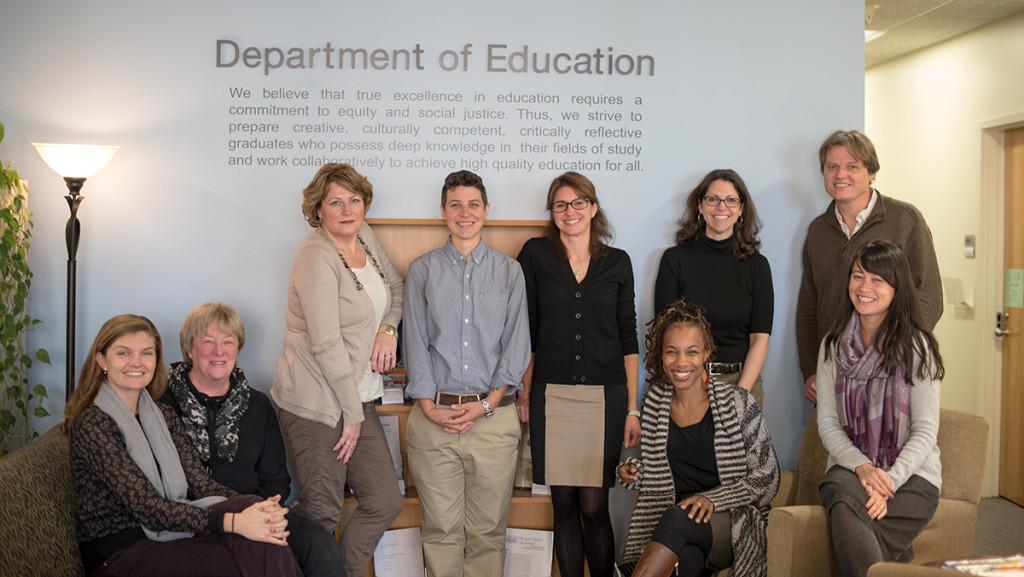Ithaca College’s School of Humanities and Sciences has announced that it will now offer an education studies minor. The minor has two tracks: one for those interested in becoming educators, and another for those who are interested in education as a social science but may not want to become teachers.
The education studies minor is an 18- to 20-credit program involving core courses in educational psychology and social and cultural foundations of education. The Teacher-Preparation Pathway prepares students for admission into graduate programs in education, while the broader Education Studies Pathway encourages students to explore a variety of issues in education across different schools at the college.
Peter Martin, associate professor and interim chair of the college’s Department of Education, said this minor was developed for several reasons. First, increasingly due to state requirements, education students are interested in getting certified as teachers at a graduate level rather than at an undergraduate level. For example, New York state requires teachers to obtain a master’s degree in five years. This created a demand from students wanting to take courses relating to education on an undergraduate level, allowing them to begin determining if they want to commit and continue on to certification on a graduate level.
Martin said the second factor was the college’s introduction of the Integrative Core Curriculum.
“When the ICC came, people who wanted to be teachers had a hard time fitting it all in on the undergraduate level,” Martin said. “So we figured those were the people that we needed to cater to.”
The third piece was that the department felt like it wasn’t reaching students who had an interest in education outside of the classroom.
“One area that our department hadn’t really been targeting is people who are interested in education but don’t want to become teachers necessarily … those who are interested in terms of being part of social justice work, education policy, advocacy around education or citizenship and education,” Martin said.
Ellie Fulmer, assistant professor of education, said Teresa Michel, instructor in the Department of Education, along with Jeff Claus, emeritus professor of education, began laying the groundwork for the minor several years ago. Fulmer said both Michel and Claus are social justice–minded, which impacted the philosophy of not only this new minor but the education department as a whole. This foundational work was expanded upon and brought up to date with current programs this year by a committee consisting of Martin; Nia Makepeace, assistant professor of education; and Sherry Deckman, former assistant professor of education.
The education studies path integrates courses from several different departments at the college, including anthropology, philosophy, politics, psychology, sociology and women’s and gender studies. Fulmer said an interdisciplinary approach, collaboration with other departments and a mind toward social justice and anti-racist teachings are key components of the minor.
“We think it’s really important to connect with, for example, women’s and gender studies,” Fulmer said. “Some people might say, ‘What does that have to do with education?’ But we feel like it’s social justice–oriented, and part of social justice is critically examining who we are as learners and maybe future teachers or individuals in the world, and you can’t do that if you’re myopic about the courses that you take.”
Martin said the education studies minor has been attracting students from all over campus. He estimates that so far approximately 30 students have registered for the minor, varying across different schools at the college.
Erin Wallace, a sophomore sociology major, recently picked up the minor. Wallace said she wants to be an elementary teacher and originally was an English major. While she did not want to be an English teacher, she had to choose a content area in order to take the education classes she was interested in. The introduction of this minor eliminated this obstacle.
“I dreaded all of my English classes but loved my education classes,” Wallace said. “I’m really happy the minor is now offered because it means I don’t have to worry about a content area anymore, and it just puts me on a better track to becoming an elementary ed teacher.”
Fulmer said the goal of the program is to support students.
“We hope that we can facilitate students who are already taking their own initiative and organizing and being beautiful vocal individuals,” Fulmer said. “We hope that we can support them, whether or not it’s through an education minor, or just sort of be a place that they feel welcome.”








